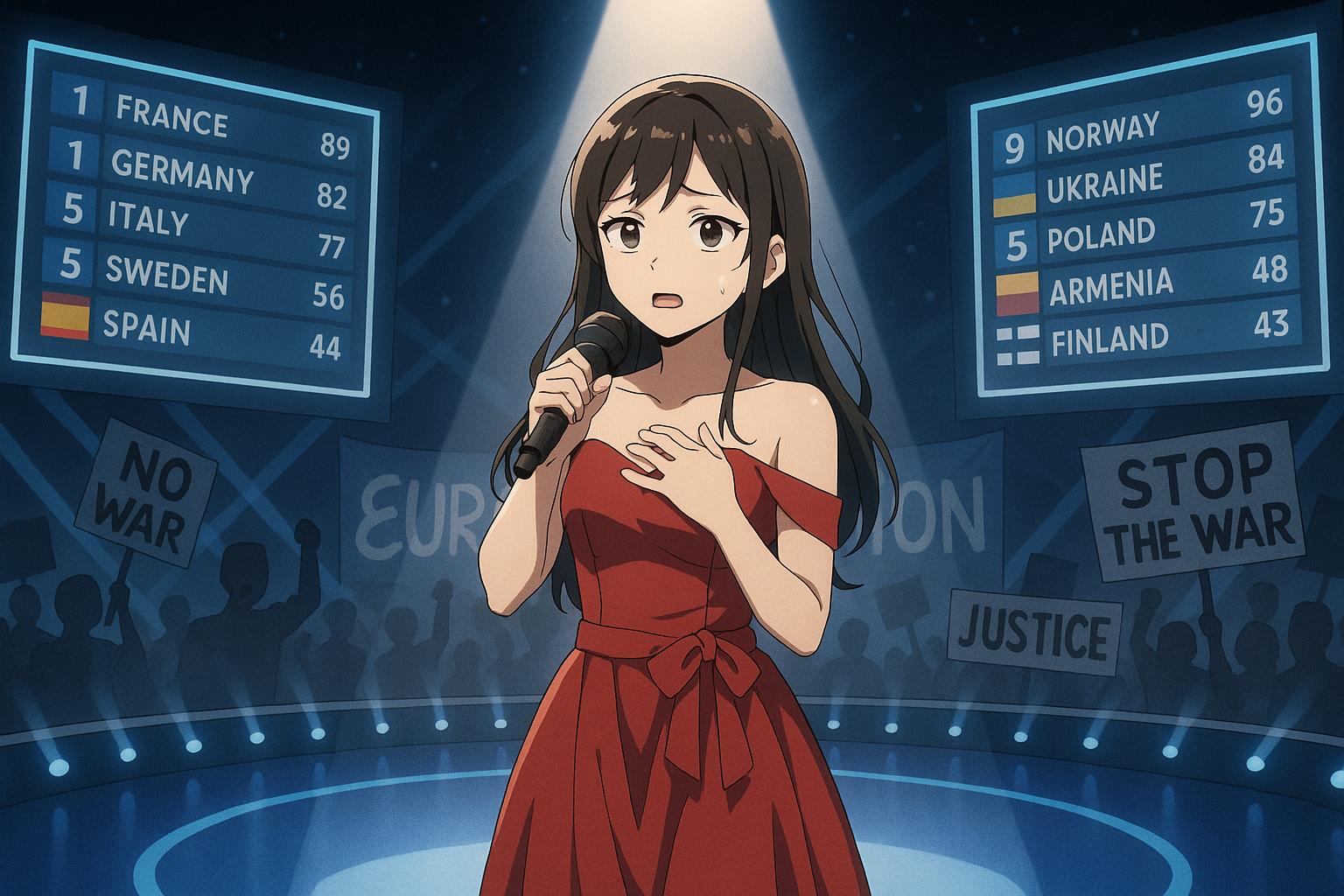Major broadcasters from Spain and Belgium have demanded an independent probe into the televoting process of the Eurovision Song Contest after Israel’s Yuval Raphael, a Gaza war survivor, secured a controversial second place amid allegations of vote manipulation and political tensions surrounding the contest.
The recent Eurovision Song Contest has ignited significant controversy, raising allegations of vote-rigging that nearly propelled Israel to victory. The public vote, which resulted in spectacular support for Israeli performer Yuval Raphael, has led national broadcasters from Spain and Belgium to demand an investigation into the televoting process. This call for scrutiny follows Raphael’s impressive tally of 357 points, landing her in second place behind Austria’s JJ, who secured 436 points for his entry, “Wasted Love.”
Israel’s representation, particularly amid the backdrop of ongoing conflict in Gaza, has spurred critical international discourse. The competition’s organisers, the European Broadcasting Union (EBU), are now facing complaints regarding the integrity of the voting system. Both RTVE, Spain’s public broadcaster, and VRT, the Flemish broadcaster in Belgium, are pressing for a thorough examination of the televote process, which has been described as potentially vulnerable to manipulation. They particularly questioned how Israel received maximum 12 points from each country in the public vote while garnering zero from professional juries.
The political landscape surrounding Eurovision this year has been notably charged. Yuval Raphael is not only a contestant but also a survivor of the Hamas-led attack that interrupted the Nova music festival on October 7, 2023. During her performance in Basel, Raphael faced significant disruptions from pro-Palestinian protesters, who vocally opposed her participation. This turmoil reflects broader calls from numerous pro-Palestinian groups, including an open letter signed by 4,000 musicians, denouncing Israel’s entry into the contest as an attempt to distract from ongoing human rights violations in Gaza.
Amid these heightened tensions, Spanish Prime Minister Pedro Sánchez has also voiced discontent with Israel’s participation in international cultural events, paralleling this stance with the exclusion of Russia from such platforms following its invasion of Ukraine. Sánchez’s remarks come in the wake of escalating violence in Gaza, with reports indicating the conflict has resulted in devastating casualties, affecting tens of thousands of Palestinians.
The EBU has acknowledged receipt of the complaints from RTVE and VRT, emphasising its commitment to transparency in the voting processes and the checks it employs to monitor voting patterns. Martin Green, Eurovision’s director, underscored the sophistication of their systems, asserting the necessity of thorough checks to mitigate any irregularities. He noted the establishment of an independent compliance monitor to ensure the validity of results, despite ongoing calls for further investigation into potential biases within the voting mechanism.
Moreover, the Spanish broadcaster has proposed an audit of its own televote, as they received an unusually high volume of votes, prompting concerns over possible manipulation linked to state-sponsored lobbying encouraging voters to support Israel. This situation resonates across other nations participating in Eurovision, as increasing numbers of broadcasters reflect on the politicisation of the event, challenging the contest’s apolitical image.
The Eurovision Song Contest, while celebrated for its musical diversity, appears to be transforming into a battleground for international political stances. The voting irregularities and the political statements made during broadcasts, such as the black screen message presented by RTVE advocating for peace in Palestine, highlight the growing tension between artistic expression and prevailing political narratives.
As France, Sweden, and Italy also found themselves embroiled in controversy, the question remains as to whether Eurovision can uphold its founding ideals amid escalating global disputes. The importance of this conversation will likely define the lead-up to future contests, particularly as the 70th Eurovision approaches next year.
Reference Map
- Paragraphs 1-2: [1], [3]
- Paragraphs 3-4: [2], [4]
- Paragraphs 5-6: [5], [7]
- Paragraphs 7-10: [6], [4]
- Paragraphs 11-12: [1], [3]
Source: Noah Wire Services
- https://www.dailymail.co.uk/news/article-14729377/Major-broadcasters-accuse-Eurovision-vote-rigging-Israels-controversial-performance-came-second.html?ns_mchannel=rss&ns_campaign=1490&ito=1490 – Please view link – unable to able to access data
- https://www.reuters.com/world/middle-east/spains-pm-wants-israel-out-international-cultural-events-over-gaza-war-2025-05-19/ – Spanish Prime Minister Pedro Sánchez has called for Israel’s exclusion from international cultural events, including the Eurovision Song Contest, due to its ongoing military campaign in Gaza. He likened the situation to Russia’s exclusion from global cultural platforms following its 2022 invasion of Ukraine, arguing against double standards. This call comes amid controversy at this year’s Eurovision finals in Basel, Switzerland, where Israel won the public televote despite calls from pro-Palestinian groups for its exclusion. The war in Gaza, which began after a Hamas attack in October 2023 that killed around 1,200 people, has resulted in over 53,000 Palestinian deaths, according to local health officials. Israel aims to dismantle Hamas’s military and governmental infrastructure in Gaza, with Prime Minister Benjamin Netanyahu stating plans to control the entire territory.
- https://www.huffingtonpost.es/life/austria-gana-eurovision-israel-segunda-diva-melody-contenta-antepenultimo-puesto.html – The Eurovision Song Contest 2025, held in Basel, Switzerland, was won by Austrian artist JJ with his song ‘Wasted Love’, a pop-operatic piece directed by Spanish artist Sergio Jaén. JJ secured the majority of the jury’s support, narrowly surpassing Israel, which finished second thanks to the televote. Israel’s entry, ‘New Day Will Rise’, was performed by Yuval Raphael, a survivor of the October 7 Hamas attack. Spain’s representative, Melody, placed a disappointing 24th with only 37 points, despite an elaborate stage setup and recognized vocal performance. RTVE expressed dissatisfaction with the result and announced the need for urgent changes in its selection process. Estonia’s Tommy Cash achieved third place, with Sweden and Italy rounding out the top five. The festival was also marked by controversies, political tensions over Israel’s participation, and unexpected voting outcomes, such as zero points for Switzerland and the United Kingdom. The edition garnered more attention for its controversies than its musical quality.
- https://www.reuters.com/lifestyle/swedens-sauna-song-is-hot-favourite-swiss-eurovision-2025-05-17/ – Austria won the Eurovision Song Contest 2025 held in Basel, Switzerland, with operatic singer JJ’s performance of ‘Wasted Love.’ This marks Austria’s third Eurovision victory, following wins by Conchita Wurst in 2014 and Udo Juergens in 1966. JJ, a 24-year-old Filipino-Austrian countertenor from Vienna, captivated both professional juries and the global audience of over 160 million by blending opera, techno, and soprano elements in his song. Israel’s Yuval Raphael, a survivor of the October 7 Hamas attacks, secured second place with his hopeful song, ‘New Day Will Rise.’ The contest was not without controversy, with protests demanding Israel’s exclusion due to the Gaza conflict, and brief disruptions during Raphael’s performance. Despite Austria’s victory resulting in increased financial pressure ahead of planned national budget cuts, Austrian leaders celebrated JJ’s achievement. JJ expressed hopes of hosting next year’s contest in Vienna and even serving as a TV host. The event attracted 100,000 attendees, including fans from as far as Chile, and was marked by messages advocating peace and human rights, such as one from Spanish broadcaster RTVE in support of Palestine.
- https://elpais.com/television/2025-05-18/tve-solicitara-este-lunes-una-auditoria-del-televoto-espanol.html – RTVE will request an audit of the Spanish televote cast during the Eurovision 2025 final, after awarding the maximum 12 points to Israel’s representative, while the professional jury gave none. The Spanish public broadcaster received 142,688 votes that night via calls, SMS, and the internet, but the information provided by the European Broadcasting Union (EBU) was insufficiently detailed. RTVE suspects possible manipulation of the popular vote, supported by previous admissions from the Israeli Ministry of Foreign Affairs about campaigns to encourage online support. In 2024 and 2025, Israel was one of the countries most favored by the public vote. Tensions between RTVE and the EBU have increased, partly due to Spain’s critical stance on the Gaza conflict. During the semifinal broadcast, RTVE commentators reminded viewers of the call to exclude Israel from the contest and mentioned civilian casualties in Gaza. This led to a formal complaint from Israeli public broadcaster KAN and the threat of sanctions from Eurovision. Spain is not alone, as other countries have also requested similar audits. This situation reignites the debate over the politicization of Eurovision despite its declared neutrality.
- https://as.com/tikitakas/musica/quien-es-jj-el-representante-de-austria-que-ha-ganado-eurovision-2025-con-wasted-love-n/ – Johannes Pietsch, known artistically as JJ, has won Eurovision 2025 representing Austria with the song ‘Wasted Love.’ Born to an Austrian father and Filipino mother, JJ is 24 years old and lived in Dubai until he was 15. He began his musical career from a young age and participated in competitions such as ‘The Voice UK’ in 2020 and ‘Starmania’ in Austria in 2021, where he was a finalist. Additionally, he studied opera at the Vienna Conservatory and classical music at the University of Vienna. His style fuses pop and opera, highlighting his impressive vocal ability. ‘Wasted Love’ was created in collaboration with Teya, who represented Austria in 2023. This victory marks Austria’s third win in Eurovision, following Udo Jürgens in 1966 and Conchita Wurst in 2014.
- https://www.world-today-journal.com/didnt-watch-but-voted-how-israel-controlled-televoting-at-the-eurovision-song-contest/ – In the run-up to the Eurovision festival, there was significant protest against Israel’s participation in the Eurovision Song Contest. The country has been widely criticized for its military offensive in the Gaza Strip following the attacks by Hamas on October 7 last year. The fact that the song was originally going to be called ‘October rain’ only further fueled the resistance. The controversy led to demonstrations in Malmö and to boos during singer Eden Golan’s performances. The fact that she collected so many points has to do with other things than just the song. Because the fact that the barely 20-year-old singer was burdened with all the sins of Israel provoked a reaction. Via the internet, right-wing politicians and other sympathizers of Israel in particular called for a massive vote for Golan. The Israeli government made visuals with voting instructions and emphasized that you could vote up to twenty times. These were widely shared. The official account of the State of Israel shared a video in which MEP Assita Kanko (N-VA) announced that she would vote for Golan. Like many others, she cited Israel’s role as a victim by making the link between the Eurovision Song Contest and the music festival where Hamas struck on October 7. The Israeli ambassador to Belgium, Idit Rosenzweig-Abu, sees another explanation for the success: “It is a voice of Europeans who are tired of privileged gatekeepers in the media blocking anyone who disagrees with them, and are fed up that violent demonstrations on campuses and in the streets praise Hamas.”
Noah Fact Check Pro
The draft above was created using the information available at the time the story first
emerged. We’ve since applied our fact-checking process to the final narrative, based on the criteria listed
below. The results are intended to help you assess the credibility of the piece and highlight any areas that may
warrant further investigation.
Freshness check
Score:
9
Notes:
The narrative concerns recent events from the Eurovision Song Contest, including allegations of vote-rigging and political tensions. It references current political leaders and events, indicating it is up-to-date.
Quotes check
Score:
8
Notes:
While there are no direct quotes in the narrative, the information about broadcaster complaints and political statements appears to be based on recent reports. The lack of direct quotes limits the score.
Source reliability
Score:
7
Notes:
The narrative originates from the Daily Mail, a widely recognised publication, but not considered the most reliable source due to its sensationalist style. The reliability is further supported by references to real events and figures.
Plausability check
Score:
9
Notes:
The claims about vote-rigging and political tensions are plausible given the historical context of Eurovision and ongoing geopolitical tensions. The narrative aligns with known political and social issues.
Overall assessment
Verdict (FAIL, OPEN, PASS): OPEN
Confidence (LOW, MEDIUM, HIGH): MEDIUM
Summary:
The narrative is recent and plausible, drawing from real geopolitical tensions and specific events like the Eurovision Song Contest. However, the reliability of the source is moderate due to its style, and there are no direct quotes to verify. Therefore, the overall assessment is open, requiring further investigation into the specific allegations of vote-rigging.













